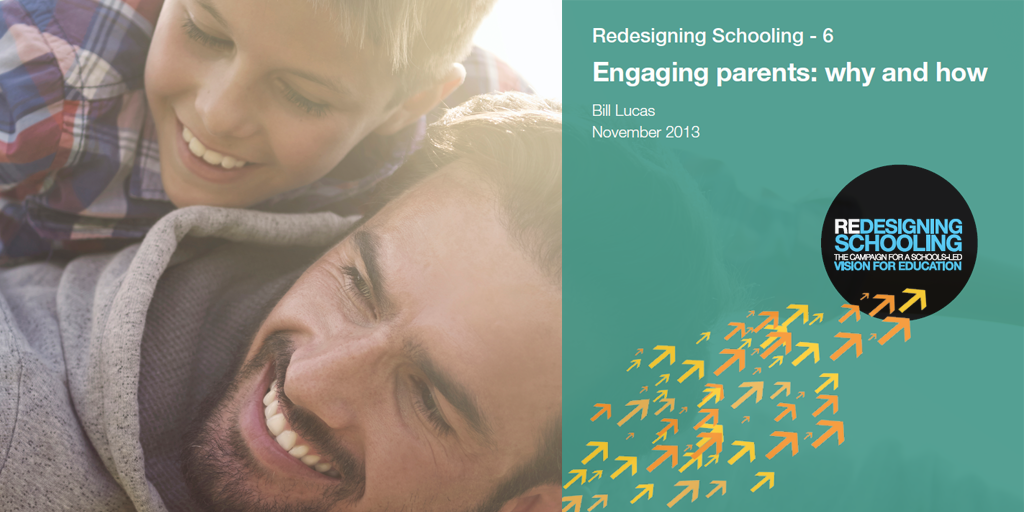
 This is the first in a series of articles adapted from the SSAT publication Redesigning Schooling – 6 – Engaging parents: why and how, authored by Professor Bill Lucas. SSAT members can download the full publication for free from the members’ area of the website.
This is the first in a series of articles adapted from the SSAT publication Redesigning Schooling – 6 – Engaging parents: why and how, authored by Professor Bill Lucas. SSAT members can download the full publication for free from the members’ area of the website.
How does parental engagement that works work? What are parents doing differently?
In his review of the factors contributing to student achievement, John Hattie concludes ‘parents can have a major effect in terms of the encouragement and expectations that they transmit to their children.’ And many other studies confirm the central but indirect role that parents play by shaping their children’s concept of themselves as learners.
This takes many forms, for example: the setting of goals; the displaying of enthusiasm; the encouragement of good study habits; the valuing of enquiry, of experimentation and of learning new things; and the enjoyment of reading.
Of all potential parent activities, communicating parent expectations produces the largest effect size with regard to children’s achievement.
Activities at home which support children’s achievement
- The use of interesting and complex vocabulary
- Discussions about school progress
- Feedback that is specific and praises effort
- Conversations about external events
- Encouragement to read for a range of purposes
- Cultural activities such as visiting libraries, museums, historic sites
- Encouragement to develop hobbies
- Encouragement to question
- Encouragement to try out new things
- Establishment and valuing of learning routines
- Support in practising sport, music or dance
- Opportunities and encouragement to undertake everyday household tasks.
Of course there is a common strand to all of these activities – talk! For the main medium of parental engagement is conversation, which may include sign language and other forms of communication. This is as true for very young children eager to play with every new idea and new word as it is for teenagers who have become temporarily taciturn or even grumpily distant.
Carol Dweck summarises the essence of effective parenting’s role in shaping learners’ self-concept unambiguously:
‘If parents want to give their children a gift, the best thing they can do is to teach their children to love challenges, be intrigued by mistakes, enjoy effort and keep on learning. That way they will have a lifelong way to build and repair their own confidence.’
At first sight, if it is what goes on in the home that really matters, then schools are in a very difficult position. For while their remit runs within the school gates, once across the threshold of their students’ homes it is a very different story.
But this is only true at first glance. There are a variety of ways in which schools can actively seek to influence parents and families and, by extension, the learning environment of the home. And there are many useful books to guide families, which schools can signpost for parents.
The most widely admired description of these methods has been developed over many years by the doyenne of this field, Joyce Epstein. Her six point typology distinguishes activities helpfully:
Six types of parental engagement
| Type 1: Parenting | Helping all families to have the basic home conditions in place, including active parenting strategies and regular communication with school. |
| Type 2: Communicating | Designing effective home-to-school and school-to-home communication methods which engage all parents regularly. |
| Type 3: Volunteering | Recruiting volunteer parents to help in school in classes and in extra-curricular activities. |
| Type 4: Learning at home | Providing good information to enable all parents to help with homework and offering other family learning activities. |
| Type 5: Decision-making | Including parents in decision-making activities, including being involved in governance, to build a sense of ownership. |
| Type 6: Collaborating with the community | Finding and using resources from the wider parent community to enrich school life. |
Each of these types of parental engagement is likely to produce gains in home-school relationships and to develop cultural capital locally. But it is those which focus most closely on learning at home – types 1 and 4 – on which schools interested in parental engagement for student achievement may wish to focus their attention.
Type 2 (communication) is, of course, also going to be important. For, just as in the home environment communication is the main medium to create positive learning environments, so too home-school communication is critically important. John Hattie has a stark reminder of how poor some schools can be at this:
‘Many parents, however, struggle to comprehend the language of learning and are thus disadvantaged in the methods they use to encourage their children to attain their expectations.’
An even simpler way of describing the kinds of parental engagement which have positive outcomes for learning is the one focusing on three kinds of activity. This was created by Janet Goodall and John Vorhaus in their review of best practice in parental engagement for the DfE in 2010 and subsequently used in the National Foundation for Educational Research (NfER) review:
- improving home-school links
- support and training for parents
- family and community-based interventions.
Goodall and Vorhaus have also produced comprehensive guidance for schools wishing to know what effective parental engagement looks like at the school level:
Parental engagement works best when
- It is whole school and strategic
- It has strong leadership with an identified, appropriately skilled member of staff in charge
- Staff are specifically trained and coached
- Parents receive clear, specific and targeted information from schools
- It makes good use of ICT
- It focuses on literacy and numeracy as well as learning ‘character’.
Goodall and Vorhaus also suggest that parental engagement flourishes where there is networking between schools that enables effective practices to be shared. Facilitating such sharing is an important part of SSAT’s work in partnership with schools and other organisations that have expertise in this area.
School leaders and teachers really wishing to understand the detailed and subtle impacts of parental engagement may wish to equip themselves with a copy of the Handbook of School-Family Partnerships.
Read the DfE’s Review of best practice in parental engagement.
Professor Bill Lucas, along with Professor Guy Claxton, created the Expansive Education Network – one of the biggest teacher researcher groups in the world. Find out more here.
Read the other articles in the series
The nature of parental engagement
What kind of parental engagement for what kind of learning?
Promising practices in parental engagement – 3 resources
Promising practices in parental engagement – building learning power
Promising practices in parental engagement – the 10 steps to success
Parental engagement – a call to action

A Desai on said:
The hyperlink at the start of this article does not work, can you help?-
https://www.ssatuk.co.uk/the-exchange/library/redesigning-schooling/